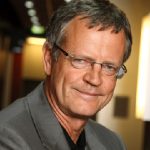Ivan Bwowe took a swipe at leaders who overstay in power
but keep reiterating that the youth are the future. “The
promise of youth being the future has been vulgarised.”
He said African governments look at young people as
liabilities instead of assets even when they are more than
half the population of most countries on the continent. “We
are the most endangered species that is the majority.”
Scheaffer Okore agreed, noting that bureaucracy and
huge government spending make it impossible for
young people to get employment. “You can’t have a big
government and then tax people to fund those who are not
even doing their job.”
However, Lillian Aber disagreed, noting that there is already
government goodwill to ensure that things get better for
the youth. “It starts with us. It starts with what attitude
we have.”
The country’s education system has for long
been derided as theoretical and out of touch with
current employment needs.
Pascal Boniface said that in France, the more educated a
youth is, the more hopeful they get about opportunities.
Bwowe said Uganda’s education system forces learners
to cram to pass exams instead of getting equipped with
the necessary skills and knowledge. “The education system
should allow everyone to flourish, not a few of us.”
On his part, Victor Ochen said getting an education does
not guarantee one a job in Uganda. “After studying,
youths fail to get jobs and people start asking, ‘Did you
study unemployment?’”
While young people often accuse the government
of not doing enough for them, some panellists
think all actors should play their part.
While acknowledging that young people face several issues,
such as underemployment and underpay, Aber said, “No
one is going to get you out of bed and give you a job”.
However, Ochen thinks that some governments are out to
intentionally keep young people poor. “We need to move
away from politics of poverty; making people poor so that
you suppress them.”
Okore emphasised that those in power do not want to be
challenged. “Everybody wants you [youth] to have a voice,
to be courageous until you stand up to them.”
In their parting shots, the panellists called for
inclusiveness in opportunities and for those in
power to stop holding young people hostage.
Ochen said the government needs to protect the most
vulnerable in society, like the cobbler in Arua who cannot
talk to his client on WhatsApp because he cannot afford to
pay social media tax. “There are people in this country who
have 10 jobs; jobs that are for the same family, jobs that
are for people from the same region.”
Okore appealed for honesty in the demands that people
make of young people, and for those in power to stop
holding young people hostage owing to the roles they played
in the past. “I hate the glamourisation of the struggle. Don’t
glamourise structural failure. We don’t have to go through
the same struggle our forefathers went through as
young people; it would mean they all failed us.”
Kampala Geopolitics Conference




